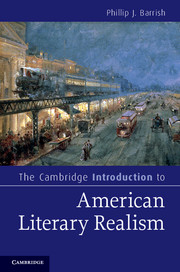Book contents
- Frontmatter
- Contents
- Illustrations
- Acknowledgments
- Introduction: American literary realism
- Chapter 1 Literary precursors, literary contexts
- Chapter 2 The “look of agony” and everyday middle-class life
- Chapter 3 Creating the “odour” of the real
- Chapter 4 Conflicting manners
- Chapter 5 “Democracy in literature”?
- Chapter 6 “The blab of the pave”
- Chapter 7 Crisis of agency
- Chapter 8 “Certain facts of life”
- Chapter 9 “The unjust spirit of caste”
- Chapter 10 New Americans write realism
- Conclusion: realisms after realism
- Notes
- Works cited
- Index
Chapter 4 - Conflicting manners
high realism and social competition
Published online by Cambridge University Press: 05 June 2012
- Frontmatter
- Contents
- Illustrations
- Acknowledgments
- Introduction: American literary realism
- Chapter 1 Literary precursors, literary contexts
- Chapter 2 The “look of agony” and everyday middle-class life
- Chapter 3 Creating the “odour” of the real
- Chapter 4 Conflicting manners
- Chapter 5 “Democracy in literature”?
- Chapter 6 “The blab of the pave”
- Chapter 7 Crisis of agency
- Chapter 8 “Certain facts of life”
- Chapter 9 “The unjust spirit of caste”
- Chapter 10 New Americans write realism
- Conclusion: realisms after realism
- Notes
- Works cited
- Index
Summary
Speaking at an influential and portentously named “Conference on the Heritage of the English-speaking Peoples and Their Responsibility,” hosted by Kenyon College in 1947, literary critic Lionel Trilling tried to explain a term that he believed was “nearly indefinable” but nonetheless fundamental to any attempt at articulating the identity of a nation or people. “Manners,” Trilling asserted, should not be understood as synonymous with the rules of politeness, which can be written down and mastered. Nor are manners equivalent to easily identifiable customs or any other “highly formulated departments of culture,” such as morals (“Manners, Morals, and the Novel” 11–12). Rather, the term manners refers to “what never gets fully stated” but instead constitutes “a culture’s hum and buzz of implication.” Manners are the “evanescent context of [a culture’s] explicit statements.” Insofar as manners consist of “that part of a culture which is made up of half-uttered or unuttered or unutterable expressions of value,” they reveal truths about the inner workings of a culture that are inaccessible if one reads only official documents or standard histories. Manners, Trilling continued, are indicated by “small actions,” such as the posture and bearing of a waiter while he is putting down a plate on a customer’s table. They include such subtleties as “the tone of greetings and the tone of quarrels” in a given culture, as well as “slang and humor,” “the arts of dress or decoration,” and even “the way children play” and “the nature of the very food we prefer” (12).
As no doubt seemed appropriate for a conference held at a moment just after one war had ended (the Second World War) and another was beginning (the Cold War), Trilling’s speech initially asserted that manners “are the things that for good or bad draw the people of a culture together and that separate them from the people of another culture.” Trilling’s wording here may have appeared to suggest a jingoistic vision of “English-speaking” culture as homogeneous, unique, and in some sense opposed to non-English-speaking cultures (the Germans? the Russians?). But he immediately went on to complicate things by adding, “in any complex culture there is not a single system of manners but a conflicting variety of manners.” He continued, “what we mean by a culture is the adjustment of this conflict.” Turning to literature, whose relation to “manners” he had in fact been invited to address, Trilling went on to argue that both “conflict” and attempted “adjustment” between differing sets of socio-cultural manners have been a key focus for the novel, ever since its founding as a literary form.
- Type
- Chapter
- Information
- The Cambridge Introduction to American Literary Realism , pp. 58 - 73Publisher: Cambridge University PressPrint publication year: 2011



